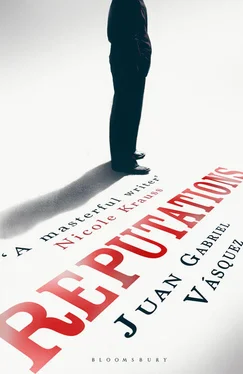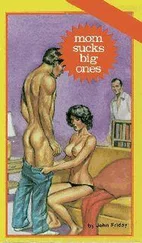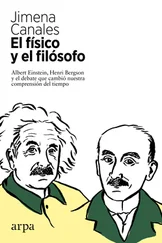Juan Gabriel Vásquez
Reputations
For Justin Webster and Assumpta Ayuso
Identical noses do not make identical men.
Rodolphe Töpffer, Essai de physiognomonie
Sitting on a bench in Parque Santander, having his shoes shined before it was time for the tribute to begin, Mallarino was suddenly sure he’d just seen a long-dead political cartoonist. He had his left foot on the wooden crate and his back pressed against the cushion, so his old hernia wouldn’t start acting up, and he’d been letting the time slip by reading the local tabloids, the cheap newsprint blackening his fingers and the huge red headlines telling him of bloody crimes, sexual secrets, aliens abducting children from barrios on the south side. Reading the tabloids was a sort of guilty pleasure: something he only allowed himself when nobody was looking. That’s what Mallarino was thinking about — the hours he’d wasted here, given over to this perversion beneath the pale sunshades — when he looked up, away from the words as one does to remember, and finding his gaze met by the tall buildings, the ever-grey sky, the trees that had always been cracking the asphalt, feeling as though he were seeing it all for the first time. And then it happened.
It was just a fraction of a second: the figure crossed Seventh Avenue in his dark suit, untidy bow tie and broad-brimmed hat, and then turned the corner beside San Francisco Church and disappeared forever. In an effort not to lose sight of him, Mallarino leaned forward and stepped off the crate just as the bootblack was about to apply the shoe polish to the leather, and left an oblong mark on his grey sock: a black eye looking up at him from below accusingly, like the man’s half-closed eyes. Mallarino, who until now had only seen the bootblack from above — the shoulders of his blue overalls speckled with fresh dandruff, the crown cleared by an encroaching baldness — found himself facing a veiny nose, small protruding ears and a moustache that was white and grey, like pigeon shit. ‘Sorry,’ said Mallarino, ‘I thought I’d seen someone.’ The man went back to his work, the well-aimed strokes of his hand applying shoe polish to the instep. ‘Hey,’ he added, ‘could I ask you a question?’
‘Go ahead, chief.’
‘Did you ever hear of Ricardo Rendón?’
Silence reached him from below: one beat, then a second.
‘Doesn’t ring a bell, sorry,’ said the man. ‘If you want we can ask my colleagues after.’
His colleagues. Two or three of them were already starting to pack up their things. They were closing up chairs, folding cloths, putting brushes with scuffed-up bristles and dented tins of shoe polish away in their wooden crates, and the air, beneath the commotion of the evening traffic, filled with the banging of metal fitting together and lids being screwed on tightly. It was ten to five in the afternoon: since when had Bogotá’s bootblacks worked fixed hours? Mallarino had drawn them on a few occasions, especially in the early days, when coming downtown and going for a stroll and having his shoes shined was a way of taking the city’s pulse, of feeling that he was a direct witness of his own material. All that had changed: Mallarino had changed; the bootblacks had changed too. He almost never came into the city any more, and had grown used to seeing the world on screens or pages, to letting life come to him instead of hunting it down in its hiding places, as if he’d gradually realized that he’d earned this and now, after so many years, it was life that should come looking for him. The bootblacks, for their part, no longer ruled their workplaces — those two square metres of public space — by virtue of a pact of honour, but rather by belonging to a union: the payment of monthly dues, the possession of a laminated identity card, which they displayed at the slightest provocation. Yes, the city was different now. But it wasn’t nostalgia that overwhelmed Mallarino as he noted the changes, but a strange desire to hold back the march of chaos, as if doing so would also hold back his own interior entropy, the slow oxidation of his organs, the erosion of his memory reflected in the city’s eroded memory: as exemplified by the fact that nobody knew who Ricardo Rendón was anymore. Ricardo Rendón: the greatest political cartoonist in Colombian history, who had just walked by in spite of having been dead for seventy-nine years, had been devoured, like so many other figures, by the insatiable hunger of oblivion. They’ll forget me too one day , thought Mallarino. As he lowered his foot off the crate and raised the other one in its place, and as he shook the paper so that a wrinkled page would return to its proper place (a dexterous flick of the wrists), Mallarino thought: Yes, they’ll forget me too . Then he thought: But not for quite a while yet. And in that moment he heard himself say: ‘What about Javier Mallarino?’
The bootblack took a second to realize the question was directed at him. ‘Sir?’
‘Javier Mallarino. Do you know who he is?’
‘The guy who does the cartoons for the newspaper,’ the man said. ‘But he doesn’t come around here any more. He got tired of Bogotá, that’s what I was told. He’s been living out of town for ages now, up in the mountains.’
So there’s something that was still remembered. It shouldn’t have surprised him: his move at the beginning of the 1980s, before the years of terrorism had even begun and people had fewer reasons for leaving, had been national news. Waiting for the bootblack to say something, a question or some exclamation, Mallarino stared at the bald spot on the top of his head, that devastated territory with the odd strand of hair popping up here and there, with marks revealing the hours spent out in the sun: potentially cancerous spots, the place where a life might begin to be extinguished. But the man didn’t say anything more. He hadn’t recognized him. In a few minutes Mallarino would receive the definitive consecration, the orgasm corresponding to a forty-year-long intercourse with his trade, and this had not ceased to surprise him: people didn’t recognize him. His political cartoons had turned him into what Rendón had been in the 1930s: a moral authority for half the country, public enemy number one for the other half, and for all of them a man able to cause the repeal of a law, overturn a judge’s decision, bring down a mayor or seriously threaten the stability of a ministry, and all this with no other weapons than paper and Indian ink. And nevertheless on the street he was nobody, he could go on being nobody , since cartoons, as opposed to columns these days, were never accompanied by a photo of their perpetrator: for the average reader out on the street it was as if they drew themselves, free of any authorship, like a downpour, or an accident.
The guy who does the cartoons. Yes, that was Mallarino. Cartoon-obsessed monomaniac: that’s what he’d been called once, in a letter to the editor, by a politician whose vanity he’d wounded. Now his eyes, always tired, gazed at the inhabitants of downtown Bogotá: the lottery-ticket seller resting on the stone wall, the student waiting for a bus, walking north and looking over his shoulder, the couple stopped in the middle of the pavement, man and woman, both office workers, both dressed in dark blue suits with white shirts, holding both each other’s hands but not looking at each other. All of them would react at the mention of his name — with admiration or repugnance, never with indifference — but none of them would be able to identify him. If he committed a crime, none of them could pick him out of a police line-up of usual suspects: Yes, I’m sure, it’s number five, the bearded one, the thin one, the bald one.
Читать дальше












